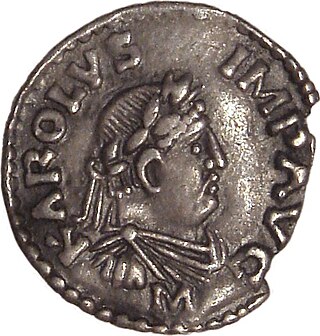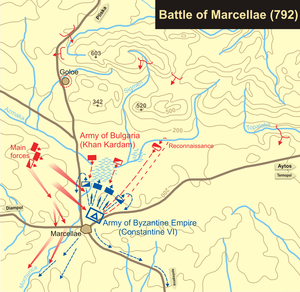
Year 768 (DCCLXVIII) was a leap year starting on Friday of the Julian calendar. The denomination 768 for this year has been used since the early medieval period, when the Anno Domini calendar era became the prevalent method in Europe for naming years.
The 790s decade ran from January 1, 790, to December 31, 799.
The 760s decade ran from January 1, 760, to December 31, 769.

Year 754 (DCCLIV) was a common year starting on Tuesday of the Julian calendar, the 754th year of the Common Era (CE) and Anno Domini (AD) designations, the 754th year of the 1st millennium, the 54th year of the 8th century, and the 5th year of the 750s decade. The denomination 754 for this year has been used since the early medieval period, when the Anno Domini calendar era became the prevalent method in Europe for naming years.

Year 774 (DCCLXXIV) was a common year starting on Saturday of the Julian calendar. The denomination 774 for this year has been used since the early medieval period, when the Anno Domini calendar era became the prevalent method in Europe for naming years.

The year 771 (DCCLXXI) was a common year starting on Tuesday of the Julian calendar. The denomination 771 for this year has been used since the early medieval period, when the Anno Domini calendar era became the prevalent method in Europe for naming years.

Year 756 (DCCLVI) was a leap year starting on Thursday of the Julian calendar, the 756th year of the Common Era (CE) and Anno Domini (AD) designations, the 756th year of the 1st millennium, the 56th year of the 8th century, and the 7th year of the 750s decade. The denomination 756 for this year has been used since the early medieval period, when the Anno Domini calendar era became the prevalent method in Europe for naming years.
Year 767 (DCCLXVII) was a common year starting on Thursday of the Julian calendar, the 767th year of the Common Era (CE) and Anno Domini (AD) designations, the 767th year of the 1st millennium, the 67th year of the 8th century, and the 8th year of the 760s decade. The denomination 767 for this year has been used since the early medieval period, when the Anno Domini calendar era became the prevalent method in Europe for naming years.

Year 773 (DCCLXXIII) was a common year starting on Friday of the Julian calendar, the 773rd year of the Common Era (CE) and Anno Domini (AD) designations, the 773rd year of the 1st millennium, the 73rd year of the 8th century, and the 4th year of the 770s decade. The denomination 773 for this year has been used since the early medieval period, when the Anno Domini calendar era became the prevalent method in Europe for naming years.

Year 778 (DCCLXXVIII) was a common year starting on Thursday of the Julian calendar, the 778th year of the Common Era (CE) and Anno Domini (AD) designations, the 778th year of the 1st millennium, the 78th year of the 8th century, and the 9th year of the 770s decade. The denomination 778 for this year has been used since the early medieval period, when the Anno Domini calendar era became the prevalent method in Europe for naming years.

Year 780 (DCCLXXX) was a leap year starting on Saturday of the Julian calendar, the 780th year of the Common Era (CE) and Anno Domini (AD) designations, the 780th year of the 1st millennium, the 80th year of the 8th century, and the 1st year of the 780s decade. The denomination 780 for this year has been used since the early medieval period, when the Anno Domini calendar era became the prevalent method in Europe for naming years.

Year 788 (DCCLXXXVIII) was a leap year starting on Tuesday of the Julian calendar, the 788th year of the Common Era (CE) and Anno Domini (AD) designations, the 788th year of the 1st millennium, the 88th year of the 8th century, and the 9th year of the 780s decade. The denomination 788 for this year has been used since the early medieval period, when the Anno Domini calendar era became the prevalent method in Europe for naming years.

Year 790 (DCCXC) was a common year starting on Friday of the Julian calendar, the 790th year of the Common Era (CE) and Anno Domini (AD) designations, the 790th year of the 1st millennium, the 90th year of the 8th century, and the 1st year of the 790s decade. The denomination 790 for this year has been used since the early medieval period, when the Anno Domini calendar era became the prevalent method in Europe for naming years.

Year 791 (DCCXCI) was a common year starting on Saturday of the Julian calendar. The denomination 791 for this year has been used since the early medieval period, when the Anno Domini calendar era became the prevalent method in Europe for naming years.

Year 796 (DCCXCVI) was a leap year starting on Friday of the Julian calendar, the 796th year of the Common Era (CE) and Anno Domini (AD) designations, the 796th year of the 1st millennium, the 96th year of the 8th century, and the 7th year of the 790s decade. The denomination 796 for this year has been used since the early medieval period, when the Anno Domini calendar era became the prevalent method in Europe for naming years.

Year 797 (DCCXCVII) was a common year starting on Sunday of the Julian calendar. The denomination 797 for this year has been used since the early medieval period, when the Anno Domini calendar era became the prevalent method in Europe for naming years.

Year 718 (DCCXVIII) was a common year starting on Saturday of the Julian calendar, the 718th year of the Common Era (CE) and Anno Domini (AD) designations, the 718th year of the 1st millennium, the 18th year of the 8th century, and the 9th year of the 710s decade. The denomination 718 for this year has been used since the early medieval period, when the Anno Domini calendar era became the prevalent method in Europe for naming years.

Year 716 (DCCXVI) was a leap year starting on Wednesday of the Julian calendar, the 716th year of the Common Era (CE) and Anno Domini (AD) designations, the 716th year of the 1st millennium, the 16th year of the 8th century, and the 7th year of the 710s decade. The denomination 716 for this year has been used since the early medieval period, when the Anno Domini calendar era became the prevalent method in Europe for naming years.

700 (DCC) was a leap year starting on Thursday of the Julian calendar, the 700th year of the Common Era (CE) and Anno Domini (AD) designations, the 700th year of the 1st millennium, the 100th and last year of the 7th century, and the 1st year of the 700s decade. As of the start of 700, the Gregorian calendar was 3 days ahead of the Julian calendar, which was the dominant calendar of the time.
Year 679 (DCLXXIX) was a common year starting on Saturday of the Julian calendar. The denomination 679 for this year has been used since the early medieval period, when the Anno Domini calendar era became the prevalent method in Europe for naming years.
















